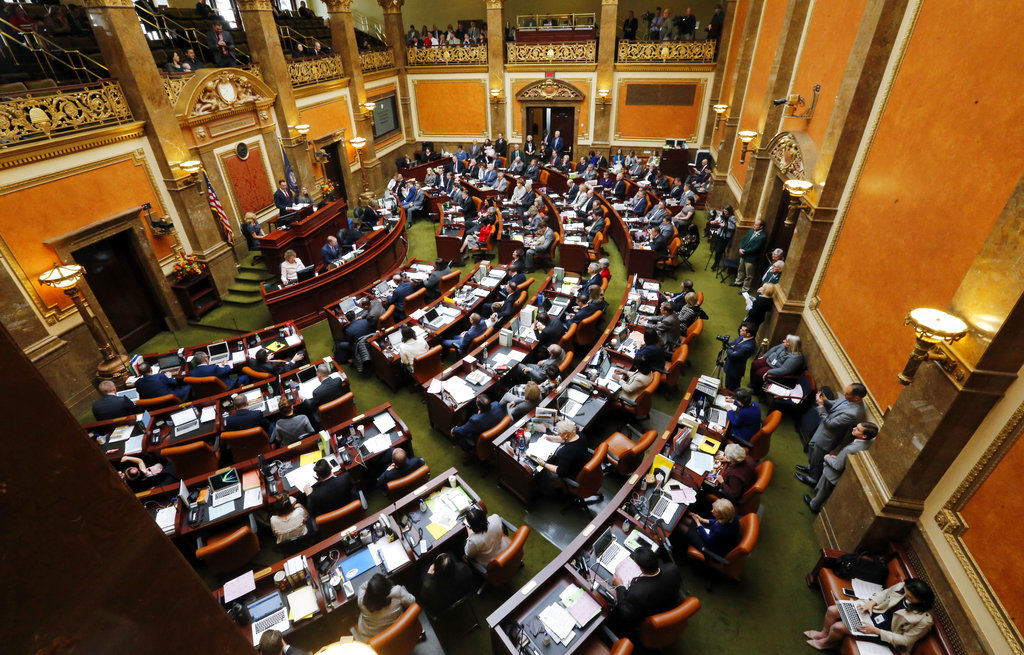
SALT LAKE CITY — Utah journalists pushed back on Monday, Feb. 26, against a resolution that would limit their time to interview representatives on the floor before house sessions begin, usually each day during the 45-day legislative session.
HR4 originally proposed that representatives be given 45 media-free minutes before house sessions. However Rep. Jim Dunnigan, R-Taylorsville, sponsor of the measure, proposed changing the time to five minutes. Despite the amendment, the journalists said a shortened time period to talk to representatives is a cause for concern.
Representatives expressing concern about needing time to prepare for the day prompted Dunnigan to introduce the restriction. He said journalists “will still have full access immediately following the floor session time and so it doesn’t change any of that. It just gives the house members some time to gather their thoughts and prepare for the day.”
However, the amendment to lessen the time in which media would be restricted from the floor was encouraged by the majority of the representatives on the Rules Committee, where the resolution was heard. The resolution would only apply to the House and does not need Senate review.
Rep. Val L. Peterson, R-Orem, said, “Forty-five is quite a bit of time. I think fifteen minutes would allow the members to still collect their thoughts and prepare for their bills that are on the calendar for the day.”
Rep. Carol Spackman-Moss, R-Holladay, said she appreciates the amendment because representatives need to be accessible to reporters. She pointed out there used to be reporters on the floor all the time which was good for the public because it helped get the word out.
“I am pleased when I have an opportunity to talk to a reporter in lengthier time and (the time before house sessions begin) often is a good time because I like to get stories out about my bill so the public can weight in,” Spackman-Moss said.
Despite the amendment to five minutes, many journalists still oppose HR4.
Ben Winslow, Fox 13 Reporter, said Fox 13 opposes HB4 because it creates restrictions for talking to lawmakers.
“We rely upon access to and conversation with lawmakers to understand complex bills and how they impact our communities,” Winslow said. He said though changing 45 minutes to 5 minutes is an improvement, his concern is time where journalists will not be on the floor being able to ask questions that directly impact the public.
“I do worry that this measure sometimes conveys a message that the press who’s job it is to report on government use of tax dollars and creation of laws sends a message sometimes that we are not welcome here and the public is not welcome here,” Winslow said with finality.
Jennifer Napier Pearce, Salt Lake Tribune editor, expressed opposition to the restriction.
“We are stand-ins for the public and we ask questions for folks who cannot be here,” Pearce said. “We write reports to push out good solid information so citizens can be informed so they can engage so they can give you the feedback on the actions of the important work you do.”
Pearce said having access to representatives before the sessions is crucial for the exchanging of information that is accurate and fair even with a proposal to change 45 minutes to 15 minutes.
“Fifteen minutes still feels egregious–it feels unnecessary,” Pearce said. “I’m sure you’ve done your homework the night before. You don’t need fifteen minutes. HR4 would take that separation between lawmakers and the press to a much higher level and essentially you would be creating another barrier between you and the public.”
Bryan Schott has been covering the Utah legislature for over 20 years. He said that HR4 gives people an opportunity to dodge questions.
“This looks like an attempt to hide from the press, so I would urge you to vote against this and keep access as is,” Schott said.
Mckenzie Romero, Utah Headliners Chapter of the Society of Professional Journalists president, urged the lawmakers to consider that journalists and lawmakers work toward the same goal of serving the public.
“When access is restricted to lawmakers that is essentially restricting the public from having access to the people who have been elected to represent them,” Romero said.
Dunnigan followed up the journalists’ remarks with a reinstatement of his position. He said he respects the role of the press, but he still thinks HR4 is reasonable.
“I think forty-five minutes to fifteen minutes is a reasonable change. It gives not very long, but a few minutes,” Dunnigan said.
Ultimately, the motion passed 6-2.




